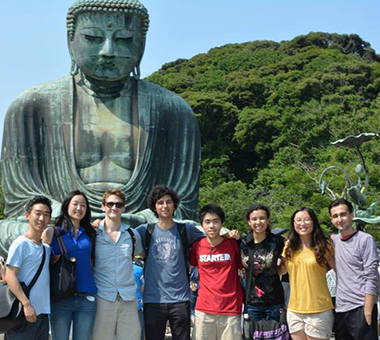“It all started from my own experience,” says MCB professor Takao Hensch of his thriving study abroad programs in Japan. When he graduated from Harvard College, he resolved to follow his dual German-Japanese heritage by securing research opportunities in both countries, but was struck by “how much initiative it took to find the right host and do it all on my own…I had to sort of staple it together myself.” Today, Hensch’s ongoing partnership with Japan’s RIKEN Research Institutes allows Harvard undergraduates to earn course credit over a summer in Japan conducting research and attending graduate-level lecture courses with the global vanguard of neuroscience and immunology.
Each winter, Hensch carefully selects qualified candidates from an annually expanding applicant pool and pairs them with a laboratory at either the RIKEN Brain Science Institute (BSI) in Tokyo or the RIKEN Center for Integrative Medical Sciences (IMS) in Yokohama. Accepted students correspond with their host labs throughout the spring semester to develop a plan of study and order necessary reagents “so that they arrive in June and hit the ground running.”
Students’ ten-week research placements coincide with both centers’ international symposia, intensive seven-to-ten-day lecture series given by world-renowned experts in the fields of Neuroscience (BSI) or Immunology (IMS) and attended by graduate students and postdocs from across the globe. According to Hensch, these lecture courses are what set the RIKEN study abroad programs apart from other undergraduate research internships: “Waves of students from around the world come and go during this time,” so the Harvard undergrads “meet cohorts of students who are just a few years ahead of them in grad school, or maybe starting a postdoc, and learn what students in Sweden …or in South America are thinking.”
Between multiple three-hour lectures and evening lab tours, attendees present research from their home institutions at lunchtime poster sessions where Harvard students can “see how science is done in different countries and what lies ahead for them if they were to go down that career path.” Hensch has no qualms about plunging Harvard undergrads into a sea of graduate students and postdocs discussing the most advanced scientific research of our time. “Harvard students,” he figures, “are used to this kind of format,” and, “in the end, they’re the ones in the front row asking all the questions.”
Because immunology is not traditionally taught at the undergraduate level, the IMS in Yokohama designed a three-week intro-to-immunology course specifically for visiting Harvard students to prepare them for the international lecture series. Since its introduction, Hensch reports, “this course has become very popular among the lab techs at the institute,” who serve as peers for the Harvard students, since they are “closer in age than the graduate students and postdocs in the lab and,” Hensch estimates, “probably the people they interact with most about day-to-day technical issues.”
Hensch has always championed the importance of international research experience. As a faculty member at RIKEN Brain Science Institute, he helped establish their international summer program in 1999, which became a model for and highlight of the study abroad programs he initiated at Harvard upon his arrival in 2006. To Hensch it’s a no-brainer: for undergrads, grad students, and postdocs alike, international experience is vital to cultivating imaginative, adaptive, and resourceful scientists. “It’s important to know there are multiple ways to do things,” he contends, “to view the same question with a different philosophy…Of course running a gel is the same or making a recording is the same, [but] if you’re observant, there are a lot of nuances in the way science is done differently [in Japan].”
As an example, he cites the funding scheme in the United States, where grants typically come in three-to-five-year increments, compared to Japan, where, at least in the past, funding might cover a twenty-year stretch. “This is sadly changing as things change economically around the world,” says Hensch, but in the meantime many Japanese scientists “are trained to think with a big-picture or longer view in mind.” Also, he adds, “The way people respect each other’s boundaries and scientific questions can be very different.” Instead of competing over research on hot topics, for instance, “they try to honor everyone’s contribution to that field and complement each other.” Over the course of their ten-week stay, Harvard students may pick up on these subtle but significant cultural differences, but they’re certain to appreciate the immediate contrast of wearing slippers and a lab coat all day at the bench.
With funding and support from the Reischauer Institute of Japanese Studies and the David Rockefeller International Experience Grant, Hensch has arranged over 100 internships in Japan since 2006 and interest among students is high and growing. This year, he received 90 applications for a total of 15 spots in Tokyo and Yokohama. To increase opportunities for this substantial population of aspiring international researchers, Hensch is in the process of piloting another program with the Okinawa Institute of Science and Technology, a new graduate school on the tropical island of Okinawa that hosts exciting (and well-funded) cutting-edge research in neuroscience, nanotechnology, and astrophysics.
And for those ambitious undergraduates with lab experience, but not a lick of Japanese vocabulary, not to worry; there’s no language requirement for these programs. As Hensch sees it, “The language is science, right?”
Harvard students and faculty at the RIKEN Brain Science Institute summer program.


